人教版(2019)必修 第一册Unit 5 Languages around the world语法精讲:情态动词表义务和需要课件&可能和猜测课件(18张ppt)
文档属性
| 名称 | 人教版(2019)必修 第一册Unit 5 Languages around the world语法精讲:情态动词表义务和需要课件&可能和猜测课件(18张ppt) | 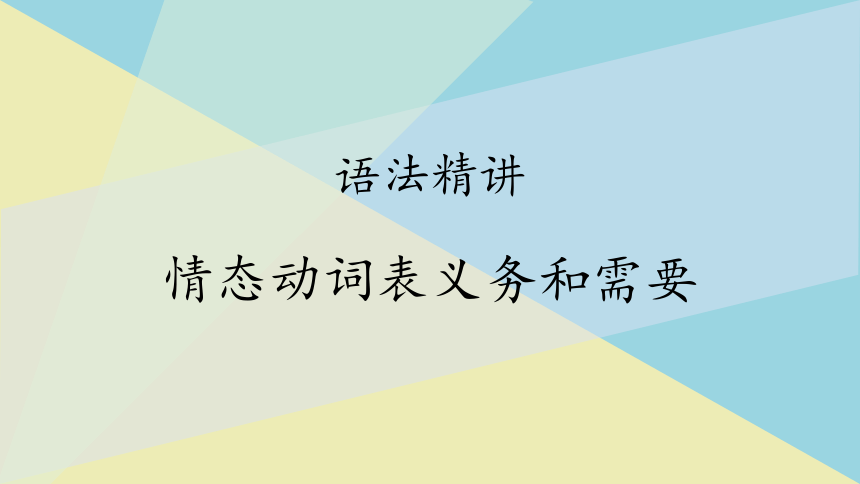 | |
| 格式 | zip | ||
| 文件大小 | 5.5MB | ||
| 资源类型 | 教案 | ||
| 版本资源 | 人教版(2019) | ||
| 科目 | 英语 | ||
| 更新时间 | 2021-10-20 19:17:26 | ||
图片预览

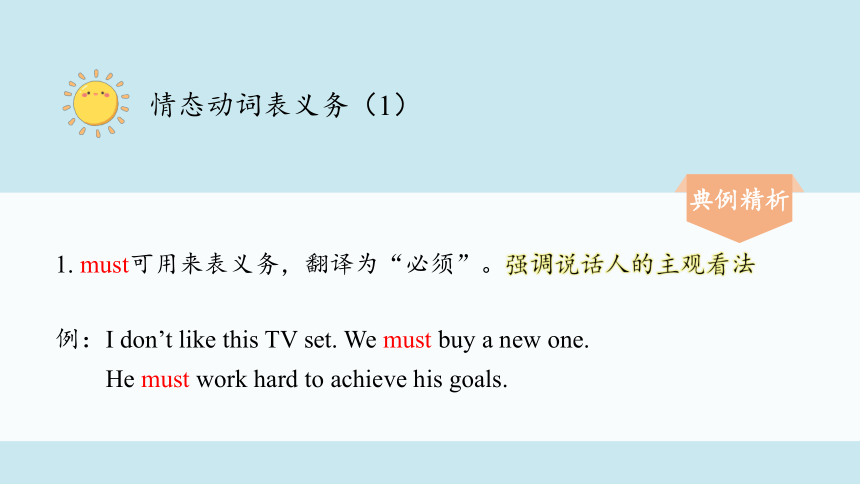
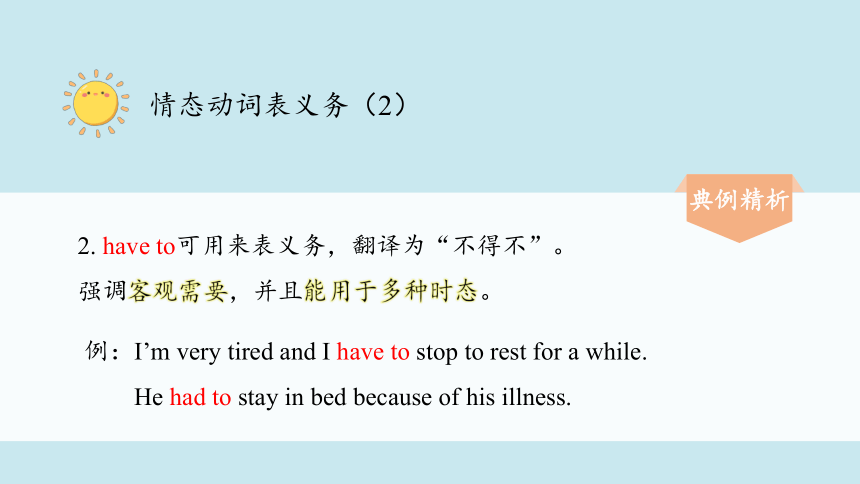
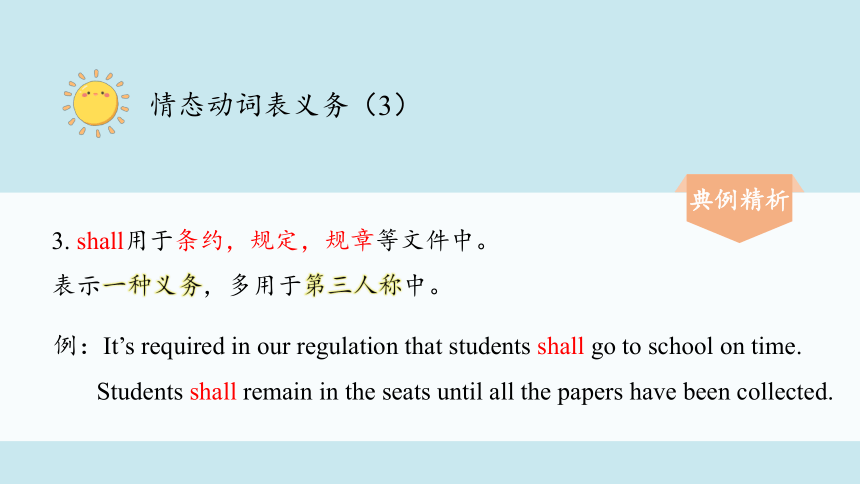
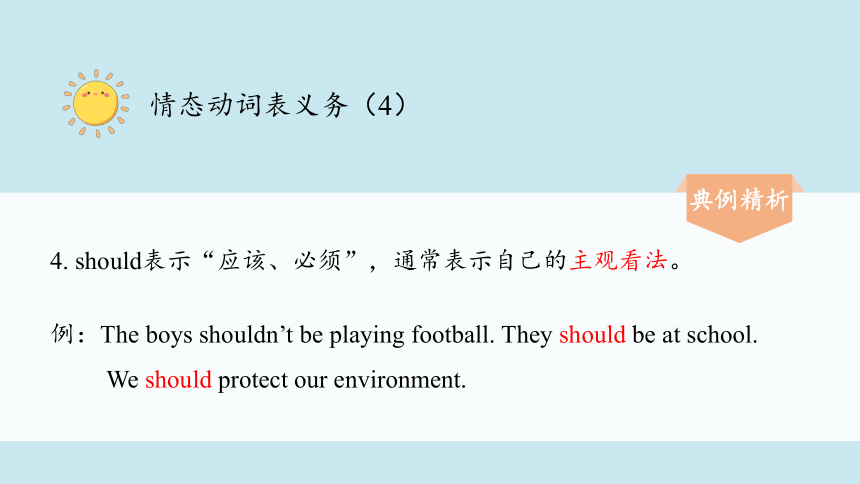
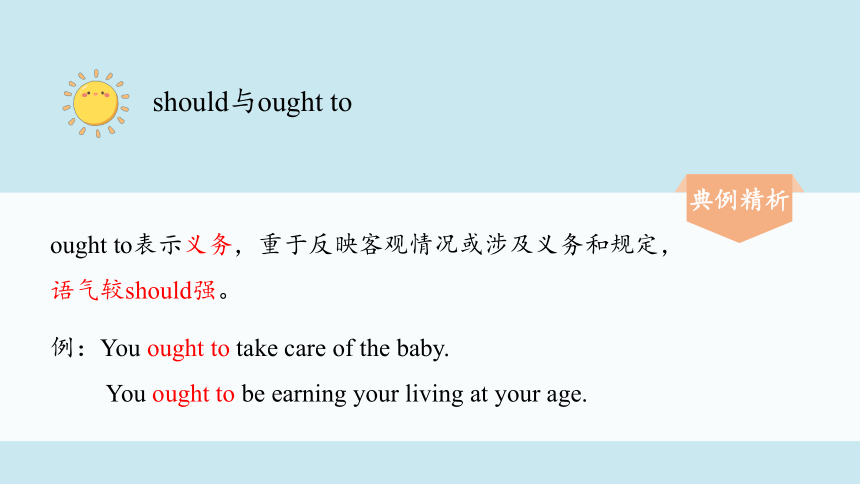
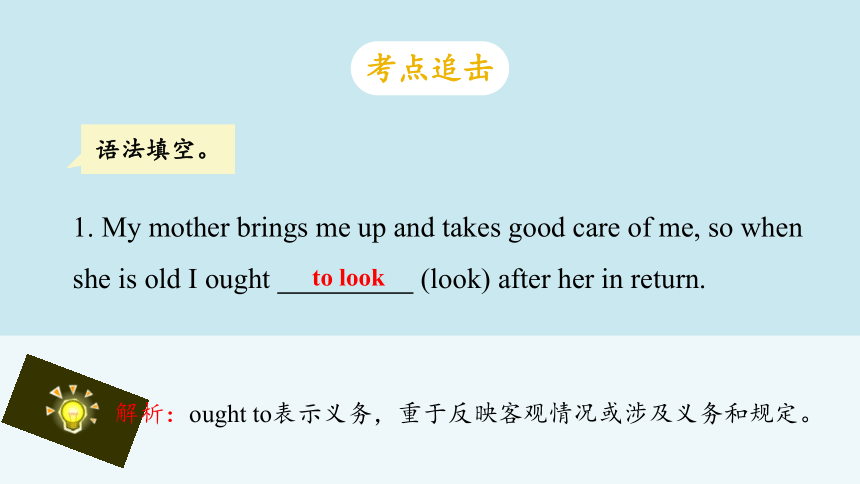
文档简介
(共18张PPT)
情态动词表义务和需要
语法精讲
典例精析
1. must可用来表义务,翻译为“必须”。
例:I don’t like this TV set. We must buy a new one.
He must work hard to achieve his goals.
情态动词表义务(1)
强调说话人的主观看法
典例精析
2. have to可用来表义务,翻译为“不得不”。
强调客观需要,并且能用于多种时态。
例:I’m very tired and I have to stop to rest for a while.
He had to stay in bed because of his illness.
情态动词表义务(2)
典例精析
3. shall用于条约,规定,规章等文件中。
表示一种义务,多用于第三人称中。
例:It’s required in our regulation that students shall go to school on time.
Students shall remain in the seats until all the papers have been collected.
情态动词表义务(3)
典例精析
4. should表示“应该、必须”,通常表示自己的主观看法。
例:The boys shouldn’t be playing football. They should be at school.
We should protect our environment.
情态动词表义务(4)
典例精析
ought to表示义务,重于反映客观情况或涉及义务和规定,语气较should强。
例:You ought to take care of the baby.
You ought to be earning your living at your age.
should与ought to
1. My mother brings me up and takes good care of me, so when she is old I ought (look) after her in return.
解析:ought to表示义务,重于反映客观情况或涉及义务和规定。
语法填空。
考点追击
to look
2. There was no more bus. They (have) to walk home.
解析:have to可用来表义务能用于多种时态。根据语境句子用一般过去时。
had
情态动词表可能和猜测
语法精讲
概述
情态动词中的must, can, could, may, might,will,would,should,ought to都表可能与猜测。
用法1
1. 肯定句中一般用must (一定),may (可能),might / could (也许,或许)表可能和猜测。
例: You’re Tom’s good friend, so you must know what he likes best.
Your mother may/might know the truth.
1. 肯定句中表可能和猜测
用法2
例:It can’t/couldn’t be the headmaster. He has gone to America.
He may not/might not know the scientist.
2. 否定句中表可能和猜测
2. 否定句中用can’t / couldn’t(不可能),may not/might not(可能不)表可能和猜测。
用法3
3. 疑问句中用can/could (能…… )表示可能和猜测。
例:Could he have finished the task
Can he be at home at present
3. 疑问句中表可能和猜测
例:1.The clouds are gathering. I’m afraid it might be pouring down soon.
2. The plane could be delayed by fog today.
典例分析
强
must
can/could
may/might
弱
may和can的过去式?
Attention:
表示语气更加委婉或可能性较小
4. should/ought to表可能和猜测时,意为“想必会,理应……” 。
用法4
例:It’s seven o’clock. Jack ought to/should be here at any moment.
There shouldn’t be any difficulty about getting you a visa.
4. should/ought to表可能和猜测
1. Peter may come with us last night, but he wasn’t very sure then.
解析:may和might都可以表示可能和猜测,句子为过去时,要用过去式might。
改错。
考点追击
might
2. It mustn’t be his father. He has gone abroad.
解析:mustn’t表示“禁止”,can’t表示“不可能”。
can’t
Bye-bye!
情态动词表义务和需要
语法精讲
典例精析
1. must可用来表义务,翻译为“必须”。
例:I don’t like this TV set. We must buy a new one.
He must work hard to achieve his goals.
情态动词表义务(1)
强调说话人的主观看法
典例精析
2. have to可用来表义务,翻译为“不得不”。
强调客观需要,并且能用于多种时态。
例:I’m very tired and I have to stop to rest for a while.
He had to stay in bed because of his illness.
情态动词表义务(2)
典例精析
3. shall用于条约,规定,规章等文件中。
表示一种义务,多用于第三人称中。
例:It’s required in our regulation that students shall go to school on time.
Students shall remain in the seats until all the papers have been collected.
情态动词表义务(3)
典例精析
4. should表示“应该、必须”,通常表示自己的主观看法。
例:The boys shouldn’t be playing football. They should be at school.
We should protect our environment.
情态动词表义务(4)
典例精析
ought to表示义务,重于反映客观情况或涉及义务和规定,语气较should强。
例:You ought to take care of the baby.
You ought to be earning your living at your age.
should与ought to
1. My mother brings me up and takes good care of me, so when she is old I ought (look) after her in return.
解析:ought to表示义务,重于反映客观情况或涉及义务和规定。
语法填空。
考点追击
to look
2. There was no more bus. They (have) to walk home.
解析:have to可用来表义务能用于多种时态。根据语境句子用一般过去时。
had
情态动词表可能和猜测
语法精讲
概述
情态动词中的must, can, could, may, might,will,would,should,ought to都表可能与猜测。
用法1
1. 肯定句中一般用must (一定),may (可能),might / could (也许,或许)表可能和猜测。
例: You’re Tom’s good friend, so you must know what he likes best.
Your mother may/might know the truth.
1. 肯定句中表可能和猜测
用法2
例:It can’t/couldn’t be the headmaster. He has gone to America.
He may not/might not know the scientist.
2. 否定句中表可能和猜测
2. 否定句中用can’t / couldn’t(不可能),may not/might not(可能不)表可能和猜测。
用法3
3. 疑问句中用can/could (能…… )表示可能和猜测。
例:Could he have finished the task
Can he be at home at present
3. 疑问句中表可能和猜测
例:1.The clouds are gathering. I’m afraid it might be pouring down soon.
2. The plane could be delayed by fog today.
典例分析
强
must
can/could
may/might
弱
may和can的过去式?
Attention:
表示语气更加委婉或可能性较小
4. should/ought to表可能和猜测时,意为“想必会,理应……” 。
用法4
例:It’s seven o’clock. Jack ought to/should be here at any moment.
There shouldn’t be any difficulty about getting you a visa.
4. should/ought to表可能和猜测
1. Peter may come with us last night, but he wasn’t very sure then.
解析:may和might都可以表示可能和猜测,句子为过去时,要用过去式might。
改错。
考点追击
might
2. It mustn’t be his father. He has gone abroad.
解析:mustn’t表示“禁止”,can’t表示“不可能”。
can’t
Bye-bye!
